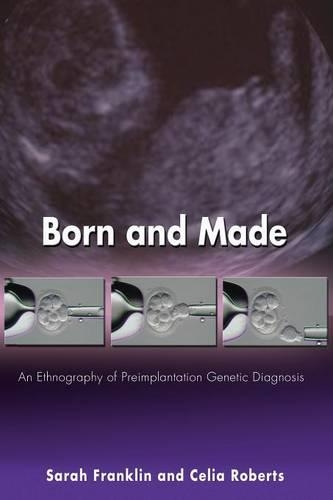
Born and Made: An Ethnography of Preimplantation Genetic Diagnosis
(Paperback)
Publishing Details
Born and Made: An Ethnography of Preimplantation Genetic Diagnosis
By (Author) Sarah Franklin
By (author) Celia Roberts
Princeton University Press
Princeton University Press
29th January 2007
United States
Classifications
Professional and Scholarly
Non Fiction
576.5
Physical Properties
Paperback
288
Width 152mm, Height 235mm
425g
Description
Are new reproductive and genetic technologies racing ahead of a society that is unable to establish limits to their use Have the "new genetics" outpaced our ability to control their future applications This book examines the case of preimplantation genetic diagnosis (PGD), the procedure used to prevent serious genetic disease by embryo selection, and the so-called "designer baby" method. Using detailed empirical evidence, the authors show that far from being a runaway technology, the regulation of PGD over the past fifteen years provides an example of precaution and restraint, as well as continual adaptation to changing social circumstances. Through interviews, media and policy analysis, and participant observation at two PGD centers in the United Kingdom, Born and Made provides an in-depth sociological examination of the competing moral obligations that define the experience of PGD.Among the many novel findings of this pathbreaking ethnography of reproductive biomedicine is the prominence of uncertainty and ambivalence among PGD patients and professionals--a finding characteristic of the emerging "biosociety," in which scientific progress is inherently paradoxical and contradictory. In contrast to much of the speculative futurology that defines this field, Born and Made provides a timely and revealing case study of the on-the-ground decision-making that shapes technological assistance to human heredity.
Reviews
"The book is a source of valuable messages; it provides enlightening perspectives on the political, moral and ethical aspects of PGD and highlights intriguing philosophical questions... Born and Made: An Ethnography of Preimplantation Genetic Diagnosis will constitute a valuable resource for professionals working in a variety of disciplines converging on the multidisciplinary field of assisted reproduction; at the same time, the book will benefit those who consider, or are referred for, assisted reproduction techniques."--Richard A. Stein, TRENDS in Endocrinology and Metabolism
Author Bio
Sarah Franklin is Professor of the Social Study of Biomedicine in the Department of Sociology at the London School of Economics and Political Science. Celia Roberts is a Lecturer in Sociology at Lancaster University.
